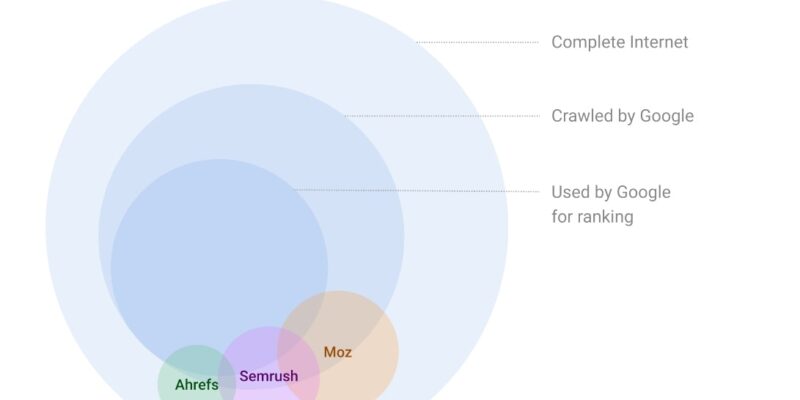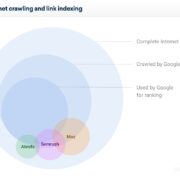The desire for measurability is as old as it is helpful. The economist Peter F. Drucker once said: “You cannot control what cannot be measured.” Since Google itself does not produce any measurability, it is evident that software providers try to fill this vacuum with their offers.
Even if such metrics always end up with some number, the calculation methods and especially the underlying database differ significantly. Let’s jump right in:
What are Domain Authority, Authority Score, and Domain Rating?
If you look at the general help pages of the providers, the explanation of the metrics at first glance reads like exactly what you are looking for. For example, Moz writes :
Domain Authority (DA) is a search engine ranking score developed by Moz that predicts how likely a website is to rank in search engine result pages (SERPs).
Semrush’s (slightly wooden) explanation of the similar-sounding Authority Score sounds even more comprehensive and valuable:
It is used to measure a domain or website’s overall quality and SEO performance.
Anyone who can measure a website’s “overall quality” is at least rhetorically reaching for the stars. Only Ahrefs did not delve too deeply into the marketing bag of tricks when it came to describing it and stayed closer to a comprehensible calculation:
Domain Rating (DR) shows the strength of a website’s backlink profile compared to the others in our database on a 100-point scale. It’s essentially a less granular version of Ahrefs Rank (AR).
In essence, all three providers promise a pivotal figure to evaluate and compare a domain from an SEO point of view. Sounds excellent and valuable so far. In the next step, let’s look at how these metrics are calculated.
How are these metrics calculated?
On the already linked help pages, the three providers also reveal more about how these key figures are calculated.
Moz does this based on its link index (“Domain Authority is based on data from our Link Explorer web index”), Semrush does the same (“The second algorithm uses backlink data”) and, unsurprisingly, the calculation is based on it also on Ahrefs on links.
Because Moz positioned its value as an alternative to Google PageRank at the time, this is understandable and consistent. The other two providers then copied and adapted this procedure.
Let’s clarify: Domain Authority and Authority Score and Domain Rating are proprietary key figures from three providers, all of which are calculated based on the link indices crawled by the provider itself.
How does Google do it?
We need to take a step back and first understand how Google crawls the web to assess these metrics. In the following diagram, you can see what this looks like:
The outer circle shows the entire Internet: all theoretically callable URLs. The Dark Web. Content behind access controls. Content that first has to be accessed by submitting forms. Content that can only be accessed from specific regions and much more.
However, Google only covers a part of this entire Internet (the middle circle): because the Googlebot has no access to the content Because he doesn’t know her.
Google again only uses a part (the inner circle) for its link index from this crawled content. Google is excellent at not rating unnatural links.
We take away: we don’t know how big the Internet is. We also do not know which part of it is recorded by Google. We know even less which recorded links are used by Google for the ranking.
How do Domain Authority, Authority Score, and Domain Rating fit into this?
To understand how the three scores from Moz, Semrush, and Ahrefs fit into this concept, let’s take the chart from above and plot these three providers’ link indices as well:
The conceptual problems that arise from this approach are pretty evident in the diagram:
Link Index Size
Google (and Bing, Yandex) crawls more URLs than individual SEO software vendors. The size of the link index of SEO software does not reach the level of completeness on which Google calculates its rankings.
Different coverage
Google does not publish which URLs are crawled. Therefore, the crawlers of the providers will inevitably use another part of the Internet as a data basis than Google.
Deviating rating:
It is even less known which links Google evaluates and which not. Therefore, the link indices do not have this knowledge and thus differ from the Google link index.
No comparability
Even within third-party link indices, they cannot be trusted to map different domains with constant errors. Depending on the environment of the fields, deviations from Google vary in size.
The overarching problem with metrics calculated on third-party link indexes is that they are not directly related to the Google ecosystem. It is unknown how significant the deviation from Google is, and it cannot even be trusted that this deviation is consistently substantial for all domains.
How does it look in action?
So much for the theory. But what does that look like in practice? A clear domain for this is mister-wong.de.
On this basis, Mister-Wong.de achieved fantastic visibility values on Google in the early days. Today, domains such as Wikipedia.org or Amazon.de have visibility of over 1,000:
But at Mister-Wong.de, the friends were short-lived. Despite the many high-quality links, the domain was quickly “burned” by Google and classified as spam. All subsequent concepts on this domain have never led to success in the Google SERPs.
With this prior knowledge, let’s now check how this domain performs in the key figures of the three SEO tools. At Ahrefs, the environment achieves a domain rating of 79 out of 100 points. This is roughly comparable to the domain bonn.de (78/100).
At Semrush, the domain mister-wong.de has an authority score of 64 out of 100. Here, too, the value is roughly comparable to the domain bonn.de (65/100):
Last but not least, for the sake of completeness, the rating from Moz. Here the domain has a domain authority of 57 out of 100. This value also roughly corresponds to the value of bonn.de (62/100):
So if you trust the key figures from Moz, Semrush, or Ahrefs, the domain mister-wong.de has a similar relevance on Google as the domain bonn.de. Anyone who has dealt with the subject of SEO, even briefly, will have to agree that this review is gross nonsense.
A link from the domain mister-wong.de will not have a positive effect that comes close to a link from the domain bonn.de – on the contrary: with a bit of bad luck, Google can even rate such links negatively.
Conclusion
Measurability is of fundamental importance in search engine optimization. SEO based on reliable data, not gut feeling, is the right path to long-term success in Google search results. However, unrelated metrics such as Domain Authority (Moz), Authority Score (Semrush), and Domain Rating (Ahrefs) can lead to false security and, therefore, wrong decisions.




















Comments